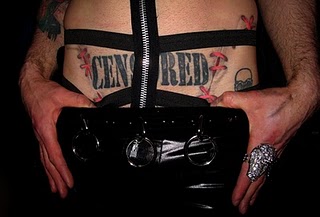Has her roses probably. Or sitting all day typing.

So, this is about the word “so.” (…) “So” may be the new “well,” new “um,” new “oh” and new “like.” No longer content to lurk in the middle of sentences, it has jumped to the beginning, where it can portend many things: transition, certitude, logic, attentiveness, a major insight.
{ NY Times | Continue reading }
Last year, grammatical tragedy struck in the heart of England when Birmingham City Council decreed that apostrophes were to be forever banished from public addresses. To the horror of purists and pedants alike, place names such as St Paul’s Square were banned and unceremoniously replaced with an apostrophe-free version: St Pauls Square.
The council’s reasoning was that nobody understands apostrophes and their misuse was so common in public signs that they were a hindrance to effective navigation. Anecdotes abounded of ambulance drivers puzzling over how to enter St James’s Street into a GPS navigation system while victims of heart attacks, strokes and hit ‘n’ run drivers passed from this world into the (presumably apostrophe-free) next.
Why the confusion? Part of the reason is that apostrophes are not particularly common in the English language: In French they occur at a rate of more than once per sentence on average. In English, they occur about once in every 20 sentences. So English speakers get less practice.
But the rules governing apostrophes are also more complex in English. In both French and English, apostrophes indicate a missing letter, such as the missing i in that’s or the v in e’er. But in English, apostrophes also indicate the possessive (or genitive) case. They are used to show that one noun owns another: St James’s Street is the street belonging to St James.
The complexity is compounded because in English, the plural is often formed by adding an s. So the word boys means more than one boy. How then do you form the possessive to indicate, for example, a ball belonging to the boys? Is it the boy’s ball or the boys’s ball or the boys’ ball?
And then there are the exceptions. Pronouns, for example, do not take a possessive apostrophe: you can’t say I’s ball or me’s bat. The truth is that knowing when to use an apostrophe is not always easy.
{ The Physics arXiv Blog | Continue reading | Mind your p’s and q’s: or the peregrinations of an apostrophe in 17th Century English | PDF }
photo { Marco Ovando }


